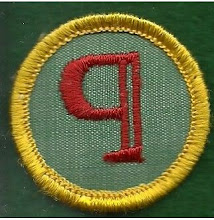What happened to the wedding and the anniversary couples? Is there a coda, an epilogue?
I looked for their names on Google, checked their hometown papers, did some searching using ancestry.com and found – not much. The anniversary couple lived to celebrate their 75th anniversary and passed away with a few months of each other a few years later. The wedding couple stayed married, or at least they were as of the last census in 2010. Not much, certainly not enough for an epilogue.
When I hear “epilogue” I always think of the TV show “The FBI”*, which was divided into acts and ended with an epilogue (OK, they spelled it "epilog") that showed what happened to the criminals featured in the story. I always made sure that watched the epilogue; I wanted to know what had happened to the bad guys. Were they sent to prison? I could be pretty sure that they were, but I watched anyway.
The “Als” (see post, from May 20, 2012 ) did not like epilogues or prologues. Al insisted that stories begin in the first chapter and end in the last, no exceptions.
For example, let's say there's a man on the run. He writes ARTXCV in the dirt of the garden bed where the protagonist is about to plant carrots and runs away. His actions start the story -- the author uses a prologue, we are dropped right into the action, the reader is omniscient. We know slightly more than the protagonist does.
However, the Als would have me edit the prologue out: Chapter One, sentence one -- the protagonist finds ARTXCV in her garden and “wonders what the heck”? We’re dropped right into the action but we don’t know any more than the protagonist does.
Most of the time, and for most genres, I agree with The Als. I have seen far too many manuscripts where the prologue is ten pages of backstory and the epilogue ten pages of “…and after that, they….”
In contemporary fiction, the prologue and epilogue should be almost inconsequential. They add a spice and depth to the body of the story, but if they were taken away, the story would still be complete. The author shouldn’t be framing the story in the prologue. The premise of the story shouldn’t be in the prologue or the resolution in the epilogue. Those things -- frame, premise, resolution – happen in the meat of the story.
However, if you happen to be writing in the style of an old drama or opera, then the prologue is where a performer will summarize the action to follow (see definition below). Though I would quickly edit out text that read, “Here we are in the wasteland to tie Prometheus to the rocks ‘cause he made the gods mad….” – this is how classic Greek drama starts. Prometheus Bound (Aeschylus, 430 BCE)
In opera and older stage drama, a performer will also often summarize the action in an epilogue. Think of Hamlet in which Horatio starts his epilogue with: “The rest is silence. Now cracks a noble heart. Goodnight, sweet prince/and flights of angels sing thee to thy rest.” He then speaks with Fortinbras and the play is summarized in about twenty lines.
_______________________________
1. (Literary & Literary Critical Terms)
a. the prefatory lines introducing a play or speech
b. the actor speaking these lines
2. a preliminary act or event
3. (Music / Classical Music) (in early opera)
a. an introductory scene in which a narrator summarizes the main action of the work
b. a brief independent play preceding the opera, esp one in honour of a patron
[from Latin prologus, from Greek prologos, from pro-2 + logos discourse]
1. (Performing Arts / Theatre)
a. a speech, usually in verse, addressed to the audience by an actor at the end of a play
b. the actor speaking this
2. (Literary & Literary Critical Terms) a short postscript to any literary work, such as a brief description of the fates of the characters in a novel
3. (Communication Arts / Broadcasting) Brit (esp formerly) the concluding programme of the day on a radio or television station, often having a religious content
[from Latin epilogus, from Greek epilogos, from logos word, speech]
_____________________________________________________
For the opening http://www.youtube.com/watch?v=crCZtW7u-NE

I will bear that in mind when it comes to editing.
ReplyDelete